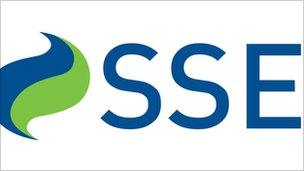Energy firm guilty of mis-selling to doorstep customers
- Published

SSE is thought to be the first big energy firm to be prosecuted for mis-selling
Scottish & Southern Energy (SSE), has been found guilty of tricking people into switching from their existing energy firms.
SSE's sales agents had used misleading sales scripts when talking to people on their doorsteps, between September 2008 and July 2009.
It had claimed they were paying too much to their current suppliers when this was not the case.
SSE was found guilty at Guildford Crown Court but said it might appeal.
Steve Playle, of Surrey County Council Trading Standards, which brought the prosecution, said he was delighted with the court's decision.
"When we first became aware of the sales script being used by Scottish and Southern Energy we were convinced that it overstepped the mark and was misleading to potential customers," he said.
"A doorstep seller had a print out which he claimed showed consumers were paying too much with their current energy supplier, but the print out did not show this.
"The seller didn't actually have a clue but the sales script was cleverly designed to put potential customers on the back foot and to open the door to a sale," he added.
'Wilful mis-selling'
It is thought to be the first time that one of the big six energy firms has been prosecuted for using dishonest sales techniques.
The problem of doorstep trickery has plagued gas and electricity consumers since the industry was privatised in the 1990s.
Audrey Gallacher, of Consumer Focus, said the firm's behaviour had involved "deliberate and wilful mis-selling."
"'Misleading doorstep energy sales have been a nightmare for consumers for years, leaving many switching to a worse energy deal," she said.
"This verdict has revealed a deliberate tactic by SSE, not the behaviour of a rogue salesperson."
SSE was found guilty on two counts out of seven charges brought under the unfair trading practices regulations and suggested it might fight the judgement.
"We are clearly disappointed with the verdict today and are now considering our legal options, which includes the possibility of an appeal," the firm said.
"We want to reassure customers, and potential customers, that this case relates to sales aids used in February 2009, which are not in use today, and we are confident that our sales processes continue to be fair and responsible."
- Published9 May 2011
- Published7 May 2011
- Published28 April 2011
- Published6 April 2011